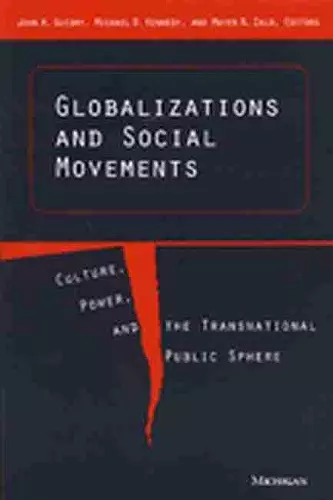Globalizations and Social Movements
Culture, Power, and the Transnational Public Sphere
Michael D Kennedy editor Mayer Zald editor John Guidry editor
Format:Paperback
Publisher:The University of Michigan Press
Currently unavailable, and unfortunately no date known when it will be back

Globalization is a set of processes that are weakening national boundaries. Both transnational and local social movements develop to resist the processes of globalization--migration, economic interdependence, global media coverage of events and issues, and intergovernmental relations. Globalization not only spurs the creation of social movements, but affects the way many social movements are structured and work. The essays in this volume illuminate how globalization is caught up in social movement processes and question the boundaries of social movement theory.
The book builds on the modern theory of social movements that focuses upon political process and opportunity, resource mobilization and mobilization structure, and the cultural framing of grievances, utopias, ideologies, and options. Some of the essays deal with the structure of international campaigns, while others are focused upon conflicts and movements in less developed countries that have strong international components. The fourteen essays are written by both well established senior scholars and younger scholars in anthropology, political science, sociology, and history. The essays cover a range of time periods and regions of the world.
This book is relevant for anyone interested in the politics and social change processes related to globalization as well as social-movement theory.
Mayer Zald is Professor of Sociology, University of Michigan. Michael Kennedy is Vice Provost for International Programs, Associate Professor of Sociology, and Director of the Center for Russian and East European Affairs, University of Michigan. John Guidry is Assistant Professor of Political Science, Augustana College.
"This volume's chief virtue is in confronting a host of analytical and theoretical challenges through a very wide variety of cases that vary in terms of cause and context. While the authors do not all subscribe to some common paradigm, they all stay on task in addressing the development and consequences of some kind of globalization. The chapters are specific, detailed, and theoretically informed. Taken as a whole, they present both a resource and a challenge to researchers who want to understand the patterns and consequences of increasing international integration."
—David S. Meyer, University of California, Irvine, American Journal of Sociology, Volume 107: No. 2 (September 2001)
ISBN: 9780472067213
Dimensions: unknown
Weight: unknown
432 pages